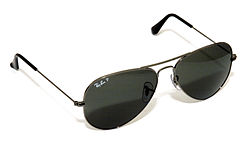This article contains promotional content .(September 2024) |
 | |
| Company type | Subsidiary |
|---|---|
| BIT: LUX (2000–2017) NYSE: LUX (1990–2017) [1] [2] | |
| Industry | Eyewear manufacturing, luxury, eyewear manufacturing and wholesale distribution, eyewear retailing |
| Founded | 1961, in Agordo, Italy |
| Founder | Leonardo Del Vecchio |
| Headquarters | , Italy |
Area served | Worldwide |
Key people | Francesco Milleri (deputy chairman and CEO) [3] |
| Products | Sunglasses, spectacle frames, prescription frames |
| Services | Opticians, optical retail, sun retail |
Number of employees | 89,000 (2019) |
| Parent | EssilorLuxottica (2018–present) [4] |
| Divisions | Ray-Ban, Persol, Oakley, LensCrafters, OPSM, Sunglass Hut, Apex by Sunglasshut, Eyemed, Pearle Vision, Sears Optical, Onesight, Target Optical |
| Website | luxottica |
Luxottica Group S.p.A. is an Italian eyewear multinational corporation headquartered in Milan. As a vertically integrated company, Luxottica designs, manufactures, distributes, and retails its eyewear brands through its own subsidiaries. It is the largest eyewear company in the world. [5] [6] It is, since October 2018, a subsidiary of EssilorLuxottica, which arose out of a merger between the Italian company and the French ophthalmic optics corporation Essilor. [7]
Contents
- History
- Founding of Luxottica
- Vertical integration and acquisitions
- Reorganization and merger with Essilor
- Eyewear brands
- Retail
- Medical managed care
- Philanthropy
- Criticism
- Monopolistic pricing practices
- Major shareholders
- See also
- References
- External links
Luxottica was founded in Agordo by Leonardo Del Vecchio in 1961 as a sunglasses manufacturer selling and branding under its own name. Del Vecchio quickly acquired numerous businesses in the pursuit of vertical integration, buying distribution companies rapidly and signing its first designer licensing agreement with Giorgio Armani. In 1990, the company listed American depositary receipts on the New York Stock Exchange where it traded until 2017.
Luxottica retails its products through stores that it owns, predominantly LensCrafters, Sunglass Hut, Pearle Vision, Target Optical, and Glasses.com. It also owns EyeMed, one of the largest vision health insurance providers. In addition to licensing prescription and non-prescription sunglasses frames for many luxury and designer brands including Chanel, Prada, Giorgio Armani, Burberry, Versace, Dolce and Gabbana, Michael Kors, Coach, Miu Miu and Tory Burch, [8] the Italian corporation further outright owns and manufactures Ray-Ban, Persol, Oliver Peoples, and Oakley. Luxottica's market power has allowed it to charge price markups of up to 1000%. [9]
In January 2017, Luxottica announced its merger with Essilor, in which Essilor would buy Luxottica while Del Vecchio would become executive chairman of the combined company, as well as co-lead the company with then-Essilor CEO Hubert Sagnières. [10] [11] The combined entity would command more than one quarter of global value sales of eyewear. [12] [13] In March 2018, the European Commission unconditionally approved the merger of Essilor and Luxottica. [14] On 1 October 2018, the new holding company EssilorLuxottica was born, resulting in combined market capitalization of approximately $70 billion. [15]


